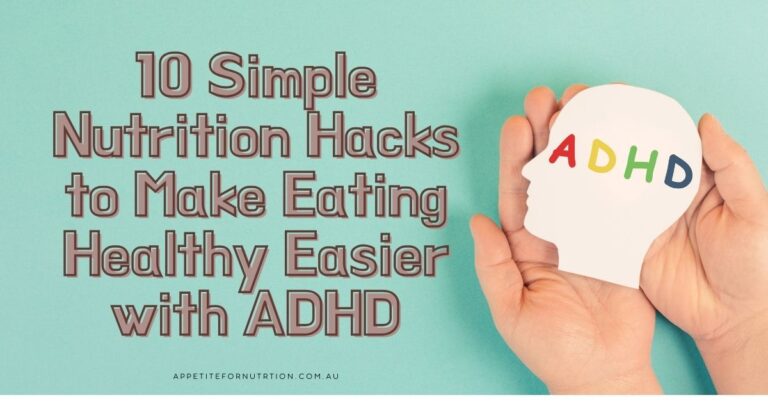
Common risk factors for children with Autism Spectrum Disorder (ASD)
Supporting Individuals with Autism Spectrum Disorder (ASD) Through Nutrition
Do you have a loved one or client living with Autism Spectrum Disorder (ASD)?
Understanding the nutritional challenges and risk factors associated with ASD is key to improving wellbeing and daily functioning.
ASD affects communication, social interaction, and behaviour in varying ways — and nutrition plays an often-overlooked but vital role in supporting physical and emotional health.
At Appetite for Nutrition, our Accredited Practising Dietitians provide compassionate, evidence-based dietary support for individuals with ASD — helping them overcome feeding challenges, reduce gastrointestinal symptoms, and optimise nutrient intake.
Common Nutrition-Related Risk Factors in Autism Spectrum Disorder
1. Overweight and Obesity
Children and adults with ASD experience higher rates of overweight and obesity compared to the general population.
This can be due to limited food preferences, lower physical activity levels, or the side effects of certain medications.
A dietitian can help with structured meal planning, portion guidance, and supporting a healthy relationship with food.
Read more: How to Build Balanced Eating Habits for Better Health
2. Gastrointestinal (GI) Issues
Over 50% of individuals with ASD experience gastrointestinal symptoms such as constipation, bloating, abdominal pain, or diarrhoea.
These issues can lead to discomfort, poor appetite, or increased irritability.
Dietitians play a key role in:
Identifying trigger foods or intolerances
Supporting gut health through fibre, probiotics, and hydration
Coordinating care with medical professionals
Learn more: Gut Health and the Brain Connection: How Food Affects Mood
3. Nutrient Deficiencies
Selective or restricted eating patterns can lead to deficiencies in Iron, Vitamin D, Calcium, and Vitamin B12 — nutrients vital for brain development, immune function, and overall health.
A 2011 study by Zimmer et al. found that children with ASD often have lower levels of essential nutrients, particularly those with limited food variety.
Dietitians can assess nutritional intake and develop practical, family-friendly strategies to:
Gradually introduce new foods
Support balanced meal variety
Prevent deficiencies through food or supplementation
Why Dietitian Support Matters
ASD-related nutrition challenges often stem from complex factors such as:
Sensory sensitivities (texture, taste, or smell aversions)
Rigid eating routines or food fixations
Gastrointestinal discomfort affecting appetite
Working with a dietitian ensures support is personalised, realistic, and sustainable — helping individuals meet nutritional goals without overwhelming change.
Our approach focuses on:
Building trust and positive experiences with food
Using structured meal plans to improve routine
Educating families and caregivers on nutrient needs
Explore more: Meet Our Dietitians and Learn How We Can Help
Practical Strategies for Families and Carers
Keep mealtimes calm and predictable
Offer a mix of familiar and new foods in small amounts
Model positive eating behaviours
Use visual supports (like picture menus) to reduce anxiety
Celebrate progress, even small wins!
The Bottom Line
Understanding and addressing nutritional challenges early can greatly improve quality of life for individuals with ASD.
Through a combination of dietitian-led education, meal planning, and family support, balanced nutrition becomes achievable and empowering.
If you or someone you support is living with autism and could benefit from tailored nutrition guidance, our team can help.
We offer both general nutrition consults and specialised dietitian support (Bariatrics, Women’s Health, Feeding Therapy, Eating Disorders, Gut Health, Sports Nutrition) available online and in person across Brisbane, Gold Coast, Melbourne, Shepparton, Bendigo and Albury-Wodonga.
Contact Appetite for Nutrition today for individual consults or tailored meal plans designed to help you eat well and feel your best.
This blog was updated October 2025.
Frequency Asked Questions
Find quick answers to common questions
Our team of NDIS-registered dietitians helps clients make practical, evidence-based food decisions that fit their goals, lifestyle, and budget.
While diet is not a cure for ASD, improving nutrient balance and gut health can help with mood, focus, and energy levels. Each case should be assessed individually.
These diets may benefit some individuals, but should only be trialled under guidance from a qualified dietitian to ensure nutritional adequacy.
Start with gradual exposure. A dietitian can develop a step-by-step plan to safely expand variety without pressure or distress.
Supplements may be required if deficiencies are confirmed. A dietitian can recommend safe, evidence-based options.
NDIS dietitians help participants reach nutrition goals by creating meal plans, improving feeding habits, and collaborating with support teams for long-term health outcomes.
(Learn more or book a consultation with an Appetite for Nutrition dietitian to get started.)



